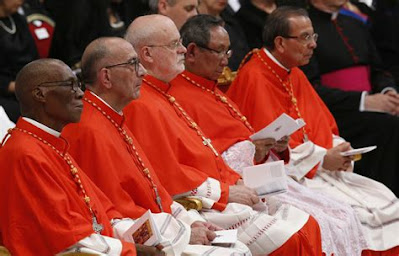The more scandals we hear about in our Church, the more disturbing it is. One thing I am glad of, is that people at the highest level in our Church have not been let off the hook. This is something that did not happen in the past. Thankfully we are getting beyond that. No one is above the law, or beyond conviction. Two cardinals have now been convicted of sexual abuse in the past and I’m glad they are being convicted, like anyone else. I have nothing against them personally, but no one should be above conviction, or just-punishment.
We are told not to judge. That has to be understood correctly. It is normal to judge a person’s actions. If someone murders another, it is morally wrong. If someone abuses another person, sexually, or in any other way, it is morally wrong and we can judge these things as right or wrong. The judgement we cannot make is the judgement of the heart. We cannot judge the heart of the person who did something like that, because only God can judge the heart. We don’t know what causes someone to act the way they do. I suspect that if we could see what goes on in the heart of each other, we would be a lot more merciful with one another.
‘Do not judge and you will not be judged. Do not condemn and you will not be condemned. Forgive and you will be forgiven.’ (Lk 6:37)
All of us are learning and hopefully will continue to learn until the day we die. This is God’s will for us, because the more we learn, the more we grow as people. The greatest learning we can do, is self-knowledge. The more we are able to look at ourselves honestly, the less likely we are to be over-critical of others. At the end of the day, if we are honest with ourselves, none of us is in a position to judge the heart of anyone else and yet we do it all the time. It is hard for us to distinguish between the actions of another and their heart. We tend to judge the person rather than their actions. If you turn it around, how would you feel if people only judged your heart, rather than by your actions. You know the way we do things and then are frustrated with ourselves, because we know we can do better, but our own weakness pulls us down.
In one of the parishes where I worked, an old lady went into a room for a meeting. In that room a carpenter was doing some work. She lost her temper with him and threatened to throw out his tools etc. Her reaction was completely out of proportion to what was going on. As it happened I turned up a few minutes later, but I realized she felt I was there to judge her. I knew that because the next time she came to me for Communion she had her head down; she wouldn’t look at me in the face. I felt the Lord saying to me, ‘You see the shame this woman feels because of her own weakness. Perhaps this is a temper she cannot control and it causes her great grief.’ It would be easy to write her off as a cantankerous old woman, without giving any consideration for the fact that maybe this is a weakness that she doesn’t have much control over and that causes her great humiliation. We cannot judge the heart.
‘Why do you notice the splinter in your brother's eye, but do not perceive the wooden beam in your own?’ The more self-knowledge we gain, the less we are likely to judge others, because we realize we have nothing to boast about. St. Thomas Aquinas says that the only thing we can take credit for are our sins. Maybe that seems a bit extreme, but think about it. Everything we have comes from God: our gifts, talents, opportunities, health, ability, intelligence, chance for education etc. To realize that also helps to bring humility, because humility is not pretending you are stupid when you know you aren’t, rather knowing what we are like before God. We are small and we are sinners, but that’s ok, because the Lord loves us as we are. The more aware of this we are, the less likely we are to only see what is wrong with the people around us. Unconsciously we tend to think that if we could sort out the people around us, the world would be ok and our life would be better. But what the Lord tells us is to focus on ourselves and then the world will start to become a better place.
A woman once came with her son to the famous Gandhi, in India, who was revered as a wise and holy man. She asked him to tell her son to give up candy, as he was totally addicted to it. Gandhi told her to come back in three weeks. So she returned three weeks later. Then Gandhi said to her son, ‘You should give up all this candy, it is going to damage your health!’ The woman was puzzled and asked him why he hadn’t said that three weeks before. He told her that he was also addicted to candy, and so he had to give it up himself before he could tell her son to do it.
When I am in traffic and someone cuts me off, or does something that scares me, I usually react like most of us and get angry with the person, calling them all kinds of words that aren’t in the bible. But then I try to stop myself and ask myself if I have ever done anything similar? because of course I have. That usually gets me to calm down. The truth is that they are not the idiot that I just called them. They are someone who made an error in judgement. We all do it all the time. If we didn’t, there wouldn’t be any crashes on the road.
If I want the world to be a better place, I must start with myself, with my own repentance, acknowledging that I am as weak as anyone else, that I make mistakes like everyone else. Only then will the world begin to change. This is also where confession is a great help. When you go to confession regularly, you become more aware of your own faults and how you are before God, and that is how we grow in humility.
‘Why do you notice the splinter in your brother's eye, but do not perceive the wooden beam in your own?’














